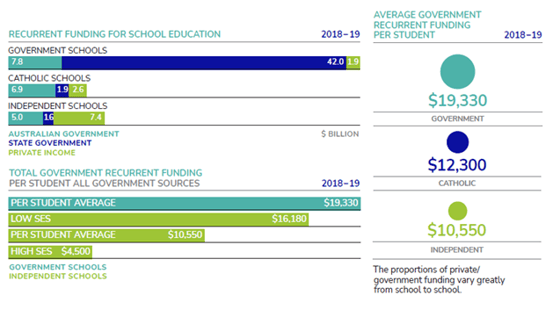According to a recent article in the Australian Financial Review (AFR) “The niche position occupied by Australia’s tax-exempt independent schools between being designated charities and big business is starting to look convenient for the schools – but decidedly less convenient for those who pay for them.”
There is no doubt that this statement is designed to polarise readers and pique their interest in the article. It is very thought provoking. There are those among you who will agree wholeheartedly and those who will decry this position. However, regardless of the rhetoric, what is fact is that most schools operate with budgets in the millions, some in the tens of millions and a few in the hundreds of millions of dollars. In addition, according to the article, many schools have capital assets worth far more than their annual turnover, with some in the billions. This is obviously a great deal of money and many schools receive a significant proportion of their income from state/territory and Commonwealth funding.
The question that needs to be asked is whether or not school governing bodies, principals and business managers are aware that, although they are governing and leading a school, there are regulatory and community expectations that the school will be governed in a similar fashion to any other type of multi-million dollar business.
 As can be seen in these charts from the Independent Schools Snapshot 2020, by Independent Schools Australia, the annual level of funding and fees paid to non-government schools is in the many billions of dollars. This is a significant financial income.
As can be seen in these charts from the Independent Schools Snapshot 2020, by Independent Schools Australia, the annual level of funding and fees paid to non-government schools is in the many billions of dollars. This is a significant financial income.
Community Expectations
School Governance has written many articles regarding the community expectations of schools and how they have changed over the years.
In one article, we noted that most non-government schools are acutely aware that they survive only with continued stakeholder support. They need to be highly accountable, responsible to their local communities, meet public standards of educational and financial accountability, and comply with the legislative, regulatory and mandatory reporting requirements that apply to all schools. Non-government schools are also more consumer-oriented than ever, with private funding contributions through the payment of fees increasing the school’s accountability to parents and providing a performance-related incentive for school governing bodies.
In a second article, we argued that schools are required to publicly disclose information to meet community expectations. For example, nearly all schools publish information on their assessment, reporting and homework expectations as current/prospective parents will often seek out this kind of information. They also publish an annual report and upload data to the My School website that outlines the financial management of the school and is available not only to their parents and the regulators, but also to the wider community.
Finally, if we look at school culture and community expectations, it is clear that a good culture is critical to avoid reputational damage and compliance breaches. From a governance perspective, culture is a part of effective risk management and schools should implement risk management programs and procedures that reflect the cultural objectives of the board. Ultimately though, if a school's culture tolerates bad financial behaviour, it will be symptomatic of greater governance issues which, if revealed by a whistleblower, the press or social media will lead to reputational damage and other issues.
The Expectations of the Regulators
Government regulators are tasked with ensuring that non-government schools meet, at a minimum, the requirements of the Australian Education Act 2013 (Cth), any relevant state or territory education laws and the related registration standards and guidelines if any.
Whenever government funding is involved, schools must expect that there will be a level of accountability for the use of the funds. In general, the funds must be used to meet the general recurrent costs of providing education programs for the students in the school. Each school needs to meet the minimum standards as set by the state or territory regulator that is tasked with ensuring that the funds are being used as intended. There have been cases where government funds have been incorrectly used or misappropriated – often resulting in negative media coverage and occasionally leading to fines and prison terms.
Given the severity of the consequences, schools must ensure that their policies and procedures in relation to financial management are compliant with relevant laws and regulations and, most importantly, that these policies are fully implemented within the school. The ability to produce a policy is not enough to demonstrate that a school is meeting its requirements. A school must have the ability to consistently produce current documentary evidence that it is managing its finances in order to maintain ongoing government funding.
So, Are Schools (Big) Businesses?
In previous years, non-government schools would decry being labelled businesses. Their defence was that they could not ascertain who their clients were - the students or their parents, and they would also argue that their ‘product’ is an intangible. How can you measure the value of a well-rounded, holistic education that encourages students to strive to reach their potential? However, that is not the argument.
The reality is that schools must operate in the same way as any registered business because the laws and regulations that apply to business apply to them and there is a community expectation that they will operate in a financially- sustainable and responsible manner. This means that non-government schools have all the fiduciary, risk management and governance duties legally required by any registered business.
The principal has an important role guiding the teachers and setting the tone and the culture of the school, and also reports to the students, staff, parents, the governing body, the general public, sometimes church authorities and government regulators. Further to this, although the principal usually occupies a unique culturally significant leadership position, in order to achieve good governance practices, the principal needs to have managerial roles, responsibility and accountability similar to those of the chief executive officer in a commercial undertaking.
In addition, if the school is a company set up as an incorporated entity, then the governing body and chair are directors as defined in the Corporations Act (2001) and have clearly defined responsibilities. Non-government schools are usually registered charities, therefore, the governance standards created under the Australian Charities and Not-for-profits Commission Act 2012 (Cth) and set out in the Australian Charities and Not-for-profits Commission Regulations 2013 (Cth) will also apply.
If we go back to the original article in the AFR, it notes “There is a growing view within the education governance space that the role of principal is too large for one person and that the business or, more accurately, the commercial aspects of the enterprise, should be managed by another senior, respected executive member working in conjunction with the principal and the council.”
Business managers generally hold key responsibilities that usually only their qualifications can support – internal audit, external audit, enterprise risk management (ERM), capital project management (often many millions of dollars, often sought from external financiers with significant covenants applied etc.) and oversight of school maintenance projects.
Principals are trained as educators and many do not necessarily have a background in finance, risk, compliance, human resources and so forth. This does not mean that they should not have responsibility for these matters, but it makes sense to have a business manager who is competent in these areas to allow the principal to focus on the ‘core business’ of the school which should be to lead the culture and to care for and educate the students.
A school’s governing body should have members with a range of skills and experience. Where possible, the governing body should include a member with business and financial expertise (that is, a member of a recognised accounting body, an experienced bursar, or a person with a history of working in finance in another capacity). Governing body members are tasked with enabling a school to achieve the best outcomes for its students and staff, and the school. They do this by identifying the school’s priorities through strategic planning and enterprise risk management, capital works and master planning, having accountability for the finances and overall resourcing, ensuring that the school vision and mission are met and that the total educational package of the school reflects the needs of students.
Governing body members, and the senior executive staff, of all non-government schools require a heightened understanding of the regulatory regime in which they operate. They must have a clear understanding of their fiduciary duties and governance requirements to ensure compliance with their role to set the strategic direction, maintain financial health and accountability, oversee overall school performance and manage strategic risk.
If this means that they need to operate the school in the same professional manner as any other regulated business, then so be it.
.png?width=800&name=SG%20HR%20Policies%20Ad%20(1).png)



.png?width=800&name=SG%20HR%20Policies%20Ad%20(1).png)

